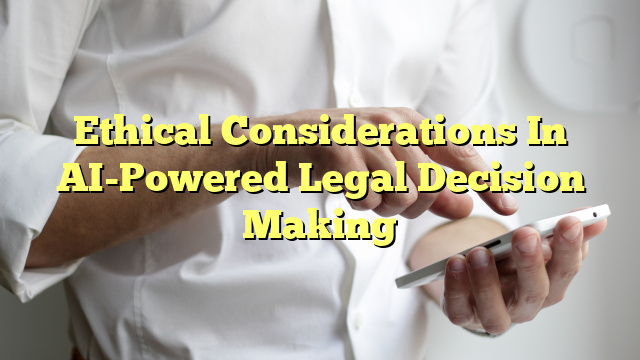Ethical Considerations in AI-Powered Legal Decision Making
The rise of artificial intelligence (AI) has created many opportunities for legal professionals to automate mundane tasks and become more efficient. Legal professionals have begun to experiment with AI technology in the practice of law. AI can assist in legal research, document drafting, and legal analysis. However, as with any new technology, there are ethical considerations to be taken into account when using AI in legal practice.
What are the ethical considerations in artificial intelligence?
AI brings a host of ethical considerations to the practice of law. AI systems have the potential to make biased decisions, as they may unknowingly replicate the biases of their creators. AI is also capable of making decisions that are difficult to explain or understand, as it may be relying on complex algorithms that are difficult to explain. Moreover, AI systems are often opaque, making it difficult to understand how they arrive at their decisions. Finally, there is the risk of AI systems making incorrect or even harmful decisions.
What are the 7 most pressing ethical issues in artificial intelligence?
The seven most pressing ethical issues in AI are:
Privacy
Privacy is a major concern when dealing with AI. AI systems are often collecting data from a variety of sources, and it is important to ensure that this data is being collected and used in a responsible and ethical manner. AI systems should be designed with privacy in mind and should only collect the data necessary for their operations. Additionally, AI systems should be designed to protect the privacy of individuals and their data.
Transparency
Transparency is also an important ethical issue in AI. AI systems are often opaque, making it difficult to understand how the system arrived at its decisions. AI developers should strive to make their systems as transparent as possible, allowing users to understand and explain the decisions the system is making. By providing greater transparency, users can better trust the decisions of the AI system.
Accountability
AI systems should be held accountable for their decisions. AI developers should strive to build systems that are able to explain their decisions and accept responsibility for their actions. AI developers should also be held responsible for any mistakes that their systems might make, and should be held to the same standards of accountability as any other professional.
Safety
Safety is a key ethical issue in AI. Developers should strive to build systems that are safe and secure, and are not capable of causing any harm to humans or other systems. AI systems should be designed and tested to ensure that they are always operating within their intended scope and are not capable of causing any unintended harm.
Bias
Bias is another major ethical issue in AI. AI systems can unknowingly replicate the biases of their creators, leading to the potential for unfair and discriminatory results. To mitigate this risk, AI developers should strive to make their systems as unbiased as possible by minimizing the potential for bias in their data sets and algorithms.
Security
Security is also a major ethical issue in AI. AI systems must be designed with security in mind to ensure that they are not vulnerable to malicious actors. AI developers should strive to build secure systems that are capable of protecting data and resources from unauthorized access and manipulation.
Fairness
Fairness is a key ethical issue in AI. AI systems should be designed to ensure that all users are treated fairly and equitably. AI developers should strive to ensure that their systems are not unfairly biased against any particular group or individual, and that all users have access to the same level of resources and services.
What ethical challenges should be addressed in AI?
<p


Thoughtful ethical considerations are absolutely essential in AI-powered legal decision making; such considerations provide a framework for successful and responsible use of technology. As AI applications become integral to legal processes, it becomes increasingly important to respect and adhere to these ethical guidelines.